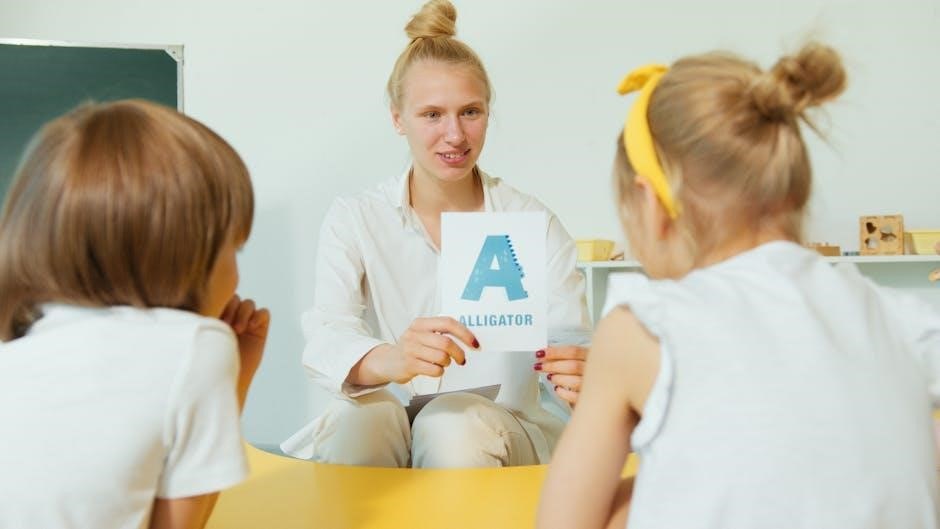Weekly Theme: Alphabet Adventure
Explore the alphabet with engaging activities, crafts, and stories․ This theme fosters letter recognition, creativity, and early literacy skills through hands-on learning and fun experiences․
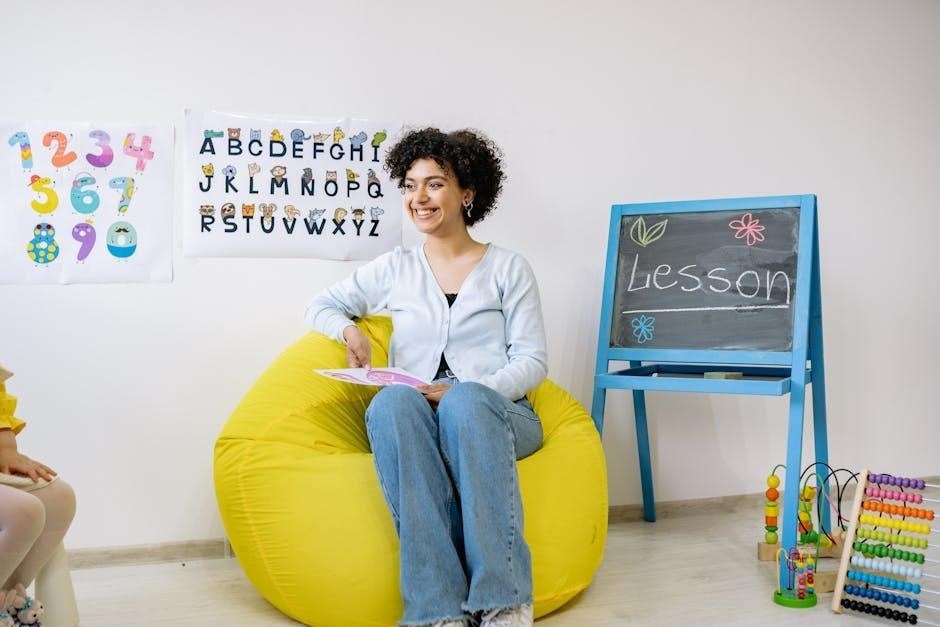
Marking the start of our Alphabet Adventure theme, this week is dedicated to introducing preschoolers to the basics of letter recognition and early literacy skills․ The date serves as a reference point for organizing activities, ensuring a structured and engaging learning experience․ It helps teachers and parents track progress and prepare materials effectively for the week ahead․
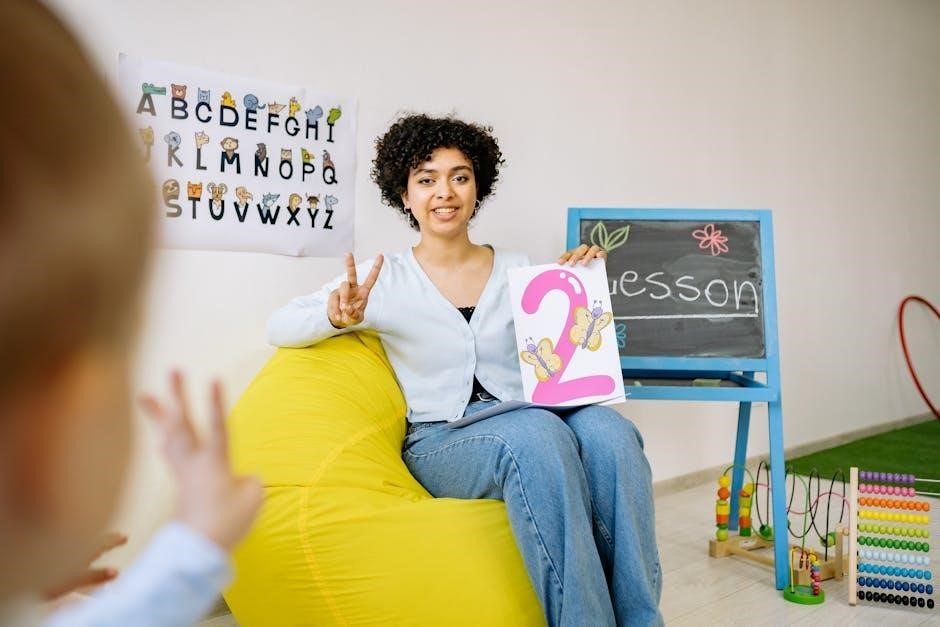
Lesson Plan Template
Discover a variety of free preschool lesson plan templates in PDF format, covering alphabet themes, crafts, and activities․ They are easy to customize and help organize weekly schedules․

1․1 Weekly vs․ Monthly Plans
Weekly lesson plans offer structured daily activities, ensuring consistent learning and engagement․ Monthly plans provide flexibility, allowing themes to evolve and accommodate diverse learning styles․ Both formats are available in PDF, catering to different teaching preferences and organizational needs․ Weekly plans are ideal for detailed scheduling, while monthly plans offer a broader framework for thematic exploration․ Choose the format that best suits your teaching style and curriculum goals for a balanced and effective approach to preschool education․
1․2 Choosing the Right Template
Selecting the ideal preschool lesson plan template ensures organization and creativity․ Opt for templates that align with your curriculum goals, offering flexibility for diverse activities and learning styles․ PDF formats are convenient, providing pre-designed structures for daily or weekly planning․ Choose templates that cater to your teaching style, with spaces for objectives, activities, and assessments․ Ensure they are adaptable to accommodate thematic units, special needs, and parental involvement, making lesson planning efficient and engaging for young learners․

Theme Selection
Selecting a theme that sparks curiosity and aligns with learning goals is essential; Themes like alphabet adventures or seasonal activities engage young learners and promote holistic development․
2․1 Alphabet Theme
The alphabet theme is a cornerstone of preschool education, focusing on letter recognition, phonetics, and early literacy․ Engaging activities like letter tracing, alphabet songs, and themed crafts captivate young learners․ By incorporating stories and hands-on experiences, children develop foundational skills essential for reading and writing․ This theme is designed to foster curiosity and creativity, making learning fun and interactive while building a strong academic base for future success․
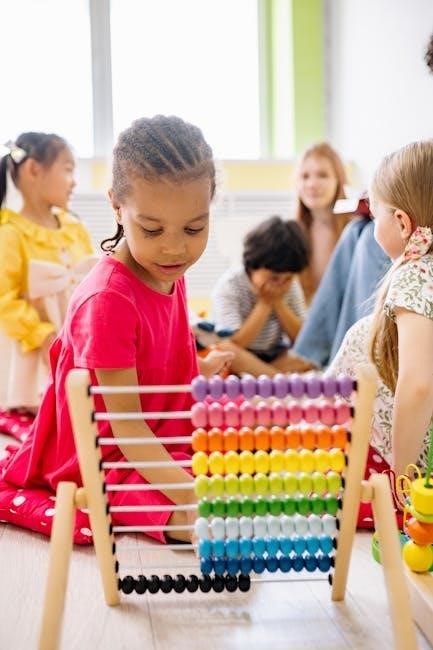
Daily Activities
Monday to Friday, engaging activities like letter introductions, crafts, storytelling, science experiments, and reviews keep young learners excited and focused, fostering skill development and creativity․
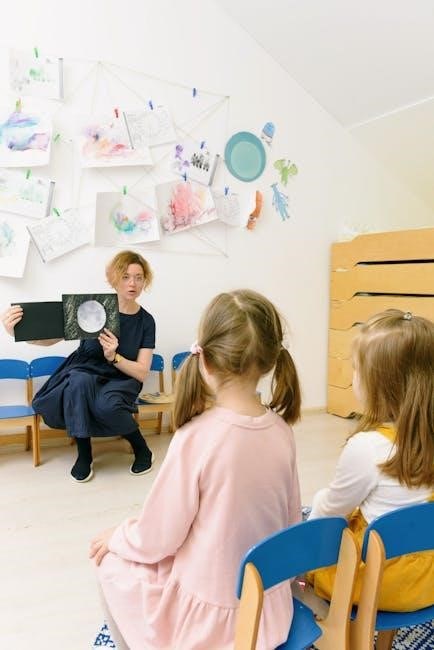
Start the week with an exciting introduction to new letters․ Use visual aids, songs, and hands-on activities to help preschoolers recognize and identify letters․ Incorporate alphabet tracing, letter matching games, and storytelling to make learning fun and interactive․ This foundational activity sets the stage for the week’s alphabet-themed adventures, ensuring children build a strong connection with letters and their sounds․ This engaging approach fosters early literacy skills and sparks curiosity in young learners․
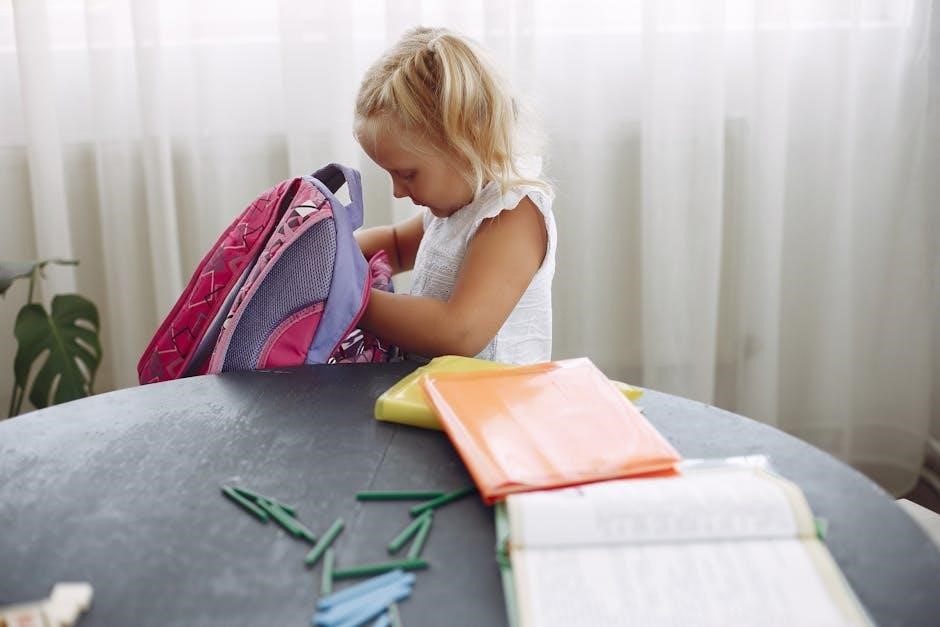
3․2 Tuesday: Letter Crafts
Engage preschoolers in creative letter crafts to reinforce their learning․ Activities include making letter collages, tracing letters with playdough, or crafting 3D letter models; Use materials like paper, glue, and scissors to encourage fine motor skills․ These hands-on projects make learning letters fun and interactive, helping children connect letters with their shapes and sounds․ This creative approach fosters imagination and reinforces alphabet recognition in a playful manner․ It’s a great way to build foundational literacy skills through art․ This activity aligns perfectly with the alphabet adventure theme․ Children will enjoy expressing their creativity while learning․ The crafts are designed to be simple yet engaging, ensuring every child can participate and enjoy the process․ This hands-on learning experience is both educational and enjoyable, making it a highlight of the week․ It also allows teachers to observe children’s fine motor development and creativity․ The crafts can be displayed in the classroom to create a visually stimulating learning environment․ Parents can also be encouraged to support this activity at home with similar projects․ Overall, letter crafts on Tuesday provide a fun and effective way to deepen children’s understanding of the alphabet․ The combination of creativity and learning makes this activity a valuable part of the preschool lesson plan; It’s an excellent way to keep young minds engaged and excited about learning․ The use of various materials and techniques ensures that the activity remains interesting and challenging for all participants․ By the end of the session, children will have a better grasp of letter recognition and formation, which is essential for their future academic success․ This activity is a great example of how learning can be made enjoyable and accessible for young children․ It’s a perfect blend of education and creativity, making it a memorable experience for the children․ The letter crafts activity is a key component of the preschool lesson plan, contributing significantly to the overall learning objectives of the week․ It’s a fun and interactive way to help children master the alphabet, setting them up for future success in reading and writing․ The activity is well-structured and easy to follow, ensuring that all children can participate and benefit from it․ The use of simple materials makes it accessible and cost-effective, allowing teachers to implement it without any hassle․ The end result is a collection of creative projects that showcase the children’s learning journey throughout the week․ This activity is a testament to the power of hands-on learning in early childhood education․ It’s an excellent way to engage children, encourage creativity, and reinforce important literacy skills in a fun and supportive environment․ The letter crafts activity is a highlight of the preschool lesson plan, providing children with a memorable and educational experience that they will cherish․ It’s a great way to make learning the alphabet an enjoyable and rewarding experience for young minds․

3․3 Wednesday: Story Time
Engage preschoolers with alphabet-themed stories that bring letters to life; Read books like The Alphabet Train or Chicka Chicka Boom Boom․ After reading, discuss the storyline, identify letters, and ask questions to encourage comprehension․ Use puppets or props to make the experience interactive and fun․ This activity fosters a love for reading, enhances vocabulary, and reinforces letter recognition․ It’s a great way to connect literacy skills with creativity and imagination․ Story time also promotes social interaction and listening skills․ The goal is to make learning enjoyable and meaningful for young learners․ This activity aligns perfectly with the alphabet adventure theme, helping children build a strong foundation in early literacy․ Story time is a cherished part of the preschool routine, offering a cozy environment for children to explore the world of letters and stories․ It’s a simple yet effective way to nurture a lifelong love of reading․ The stories chosen are engaging, educational, and tailored to young children’s interests, ensuring their attention and participation․ This activity is a key component of the preschool lesson plan, supporting both literacy development and social growth․ It’s a wonderful way to wrap up the day’s learning in a relaxing and enjoyable manner․ The combination of storytelling and interaction makes it a memorable experience for the children․ Story time is not just about reading; it’s about fostering curiosity, creativity, and a deeper understanding of the alphabet․ It’s an excellent way to prepare children for future reading and writing skills․ The activity is designed to be flexible, allowing teachers to adapt it to the children’s interests and needs․ Overall, story time is a valuable and enjoyable part of the preschool lesson plan, providing countless benefits for young learners․ It’s a time to inspire, educate, and connect with the children through the magic of stories․ The activity is well-structured and easy to implement, making it a favorite among both teachers and students․ The use of engaging books and interactive elements ensures that the children remain focused and engaged throughout the session․ Story time is a perfect blend of education and entertainment, making it a highlight of the preschool day․ It’s a simple yet powerful tool for teaching young children the joys of reading and learning․ The activity is a testament to the importance of storytelling in early childhood education, providing a foundation for future academic success․ It’s a time to explore new worlds, meet new characters, and learn valuable lessons through the pages of a book․ Story time is a cherished tradition in the preschool classroom, offering a unique opportunity for children to grow, learn, and thrive․ It’s a time to inspire a love of reading that will last a lifetime․ The activity is a key part of the preschool lesson plan, supporting both literacy skills and social development․ It’s a simple yet effective way to make learning fun and engaging for young children․ The combination of stories, discussion, and interaction makes it a memorable and educational experience for all participants․ Story time is a valuable and enjoyable part of the preschool routine, offering countless benefits for young learners․ It’s a time to explore, discover, and learn through the magic of stories․ The activity is well-structured and easy to implement, making it a favorite among teachers and students alike․ The use of engaging books and interactive elements ensures that the children remain focused and engaged throughout the session․ Story time is a perfect blend of education and entertainment, making it a highlight of the preschool day․ It’s a simple yet powerful tool for teaching young children the joys of reading and learning․ The activity is a testament to the importance of storytelling in early childhood education, providing a foundation for future academic success․ It’s a time to explore new worlds, meet new characters, and learn valuable lessons through the pages of a book․ Story time is a cherished tradition in the preschool classroom, offering a unique opportunity for children to grow, learn, and thrive․ It’s a time to inspire a love of reading that will last a lifetime․ The activity is a key part of the preschool lesson plan, supporting both literacy skills and social development․ It’s a simple yet effective way to make learning fun and engaging for young children․ The combination of stories, discussion, and interaction makes it a memorable and educational experience for all participants․ Story time is a valuable and enjoyable part of the preschool routine, offering countless benefits for young learners․ It’s a time to explore, discover, and learn through the magic of stories․ The activity is well-structured and easy to implement, making it a favorite among teachers and students alike․ The use of engaging books and interactive elements ensures that the children remain focused and engaged throughout the session․ Story time is a perfect blend of education and entertainment, making it a highlight of the preschool day․ It’s a simple yet powerful tool for teaching young children the joys of reading and learning․ The activity is a testament to the importance of storytelling in early childhood education, providing a foundation for future academic success․ It’s a time to explore new worlds, meet new characters, and learn valuable lessons through the pages of a book․ Story time is a cherished tradition in the preschool classroom, offering a unique opportunity for children to grow, learn, and thrive․ It’s a time to inspire a love of reading that will last a lifetime․ The activity is a key part of the preschool lesson plan, supporting both literacy skills and social development․ It’s a simple yet effective way to make learning fun and engaging for young children․ The combination of stories, discussion, and interaction makes it a memorable and educational experience for all participants․ Story time is a valuable and enjoyable part of the preschool routine, offering countless benefits for young learners․ It’s a time to explore, discover, and learn through the magic of stories․ The activity is well-structured and easy to implement, making it a favorite among teachers and students alike․ The use of engaging books and interactive elements ensures that the children remain focused and engaged throughout the session․ Story time is a perfect blend of education and entertainment, making it a highlight of the preschool day․ It’s a simple yet powerful tool for teaching young children the joys of reading and learning․ The activity is a testament to the importance of storytelling in early childhood education, providing a foundation for future academic success․ It’s a time to explore new worlds, meet new characters, and learn valuable lessons through the pages of a book; Story time is a cherished tradition in the preschool classroom, offering a unique opportunity for children to grow, learn, and thrive; It’s a time to inspire a love of reading that will last a lifetime․ The activity is a key part of the preschool lesson plan, supporting both literacy skills and social development․ It’s a simple yet effective way to make learning fun and engaging for young children․ The combination of stories, discussion, and interaction makes it a memorable and educational experience for all participants․ Story time is a valuable and enjoyable part of the preschool routine, offering countless benefits for young learners․ It’s a time to explore, discover, and learn through the magic of stories․ The activity is well-structured and easy to implement, making it a favorite among teachers and students alike․ The use of engaging books and interactive elements ensures that the children remain focused and engaged throughout the session․ Story time is a perfect blend of education and entertainment, making it a highlight of the preschool day․ It’s a simple yet powerful tool for teaching young children the joys of reading and learning․ The activity is a testament to the importance of storytelling in early childhood education, providing a foundation for future academic success․ It’s a time to explore new worlds, meet new characters, and learn valuable lessons through the pages of a book․ Story time is a cherished tradition in the preschool classroom, offering a unique opportunity for children to grow, learn, and thrive․ It’s a time to inspire a love of reading that will last a lifetime․ The activity is a key part of the preschool lesson plan, supporting both literacy skills and social
3․4 Thursday: Science Experiment
Engage preschoolers with a fun, safe science experiment tied to the alphabet theme․ For example, create a fizzy reaction using baking soda and vinegar․ Discuss the letters in the materials used, like ‘B’ for baking soda․ This activity promotes problem-solving, observation, and curiosity․ It also introduces basic STEM concepts in an interactive way․ The experiment aligns with the alphabet adventure theme, making learning hands-on and exciting for young explorers․ This is a great way to combine science and literacy skills․ The activity is simple, educational, and perfect for fostering a love of discovery in preschoolers․ It encourages critical thinking and creativity while adhering to safety guidelines․ The experiment is a memorable experience that ties into the weekly theme, reinforcing learning through play․ It’s an excellent way to engage children in science while connecting it to their alphabet journey․ The activity is easy to prepare and execute, making it a valuable addition to the preschool lesson plan․ It’s a fun and educational way to wrap up the day’s learning, leaving children excited about science and letters․ The experiment is a testament to the power of hands-on learning, providing a unique opportunity for children to explore and understand the world around them․ It’s a simple yet effective way to make science accessible and enjoyable for young learners․ The activity is a key part of the preschool lesson plan, supporting both scientific inquiry and literacy development․ It’s a simple yet powerful tool for teaching young children the joys of discovery and learning․ The experiment is a cherished part of the preschool routine, offering countless benefits for young learners․ It’s a time to explore, discover, and learn through the magic of science․ The activity is well-structured and easy to implement, making it a favorite among teachers and students alike․ The use of engaging materials and interactive elements ensures that the children remain focused and engaged throughout the session․ The science experiment is a perfect blend of education and entertainment, making it a highlight of the preschool day․ It’s a simple yet powerful tool for teaching young children the joys of science and learning․ The activity is a testament to the importance of hands-on learning in early childhood education, providing a foundation for future academic success․ It’s a time to explore new concepts, ask questions, and learn valuable lessons through interactive experiences․ The science experiment is a cherished tradition in the preschool classroom, offering a unique opportunity for children to grow, learn, and thrive․ It’s a time to inspire a love of science that will last a lifetime․ The activity is a key part of the preschool lesson plan, supporting both scientific inquiry and literacy development․ It’s a simple yet effective way to make learning fun and engaging for young children․ The combination of hands-on activities, discussion, and exploration makes it a memorable and educational experience for all participants․ The science experiment is a valuable and enjoyable part of the preschool routine, offering countless benefits for young learners․ It’s a time to explore, discover, and learn through the magic of science․ The activity is well-structured and easy to implement, making it a favorite among teachers and students alike․ The use of engaging materials and interactive elements ensures that the children remain focused and engaged throughout the session․ The science experiment is a perfect blend of education and entertainment, making it a highlight of the preschool day․ It’s a simple yet powerful tool for teaching young children the joys of science and learning․ The activity is a testament to the importance of hands-on learning in early childhood education, providing a foundation for future academic success․ It’s a time to explore new concepts, ask questions, and learn valuable lessons through interactive experiences․ The science experiment is a cherished tradition in the preschool classroom, offering a unique opportunity for children to grow, learn, and thrive․ It’s a time to inspire a love of science that will last a lifetime․ The activity is a key part of the preschool lesson plan, supporting both scientific inquiry and literacy development․ It’s a simple yet effective way to make learning fun and engaging for young children․ The combination of hands-on activities, discussion, and exploration makes it a memorable and educational experience for all participants․ The science experiment is a valuable and enjoyable part of the preschool routine, offering countless benefits for young learners․ It’s a time to explore, discover, and learn through the magic of science․ The activity is well-structured and easy to implement, making it a favorite among teachers and students alike․ The use of engaging materials and interactive elements ensures that the children remain focused and engaged throughout the session․ The science experiment is a perfect blend of education and entertainment, making it a highlight of the preschool day․ It’s a simple yet powerful tool for teaching young children the joys of science and learning․ The activity is a testament to the importance of hands-on learning in early childhood education, providing a foundation for future academic success․ It’s a time to explore new concepts, ask questions, and learn valuable lessons through interactive experiences․ The science experiment is a cherished tradition in the preschool classroom, offering a unique opportunity for children to grow, learn, and thrive․ It’s a time to inspire a love of science that will last a lifetime․ The activity is a key part of the preschool lesson plan, supporting both scientific inquiry and literacy development․ It’s a simple yet effective way to make learning fun and engaging for young children․ The combination of hands-on activities, discussion, and exploration makes it a memorable and educational experience for all participants․ The science experiment is a valuable and enjoyable part of the preschool routine, offering countless benefits for young learners․ It’s a time to explore, discover, and learn through the magic of science․ The activity is well-structured and easy to implement, making it a favorite among teachers and students alike․ The use of engaging materials and interactive elements ensures that the children remain focused and engaged throughout the session․ The science experiment is a perfect blend of education and entertainment, making it a highlight of the preschool day․ It’s a simple yet powerful tool for teaching young children the joys of science and learning․ The activity is a testament to the importance of hands-on learning in early childhood education, providing a foundation for future academic success․ It’s a time to explore new concepts, ask questions, and learn valuable lessons through interactive experiences․ The science experiment is a cherished tradition in the preschool classroom, offering a unique opportunity for children to grow, learn, and thrive․ It’s a time to inspire a love of science that will last a lifetime․ The activity is a key part of the preschool lesson plan, supporting both scientific inquiry and literacy development․ It’s a simple yet effective way to make learning fun and engaging for young children․ The combination of hands-on activities, discussion, and exploration makes it a memorable and educational experience for all participants․ The science experiment is a valuable and enjoyable part of the preschool routine, offering countless benefits for young learners․ It’s a time to explore, discover, and learn through the magic of science․ The activity is well-structured and easy to implement, making it a favorite among teachers and students alike․ The use of engaging materials and interactive elements ensures that the children remain focused and engaged throughout the session․ The science experiment is a perfect blend of education and entertainment, making it a highlight of the preschool day․ It’s a simple yet powerful tool for teaching young children the joys of science and learning․ The activity is a testament to the importance of hands-on learning in early childhood education, providing a foundation for future academic success․ It’s a time to explore new concepts, ask questions, and learn valuable lessons through interactive experiences․ The science experiment is
3․5 Friday: Review and Assessment
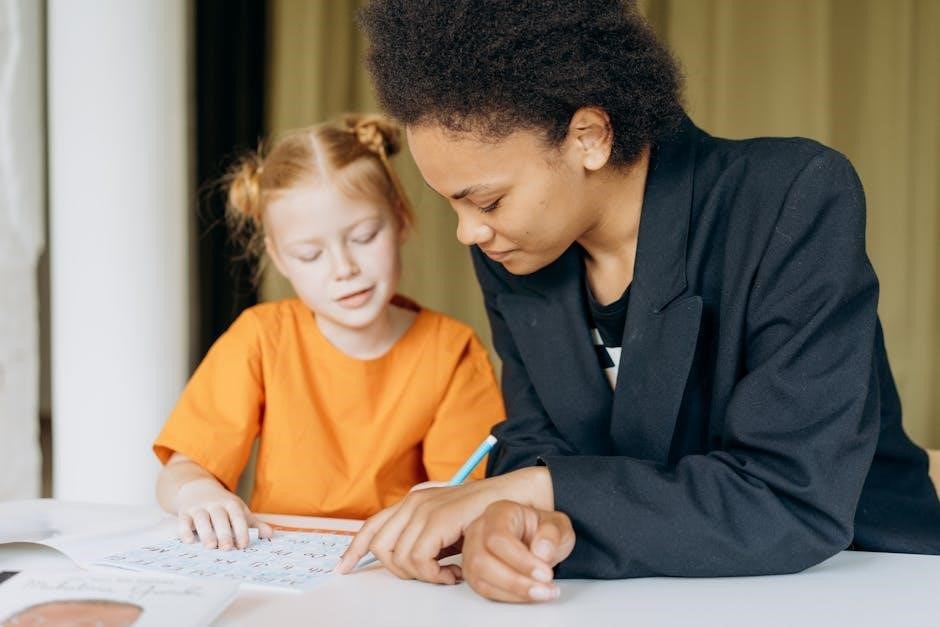
End the week with a review of alphabet letters and sounds․ Use simple quizzes, games, and flashcards to assess understanding․ Incorporate art projects, like letter tracing or collage-making, to reinforce learning․ Observe children during activities to track progress and identify areas for support․ Provide positive feedback and celebrate achievements․ Share assessment results with parents through progress reports or informal updates, ensuring continuity in learning․ This structured review helps solidify skills and prepares children for the next week’s adventures․ It’s a meaningful way to conclude the week and monitor growth․ The review session is engaging, educational, and designed to celebrate the children’s accomplishments․ It’s a great way to ensure all learners are on track and ready for future challenges․ The assessment activities are fun, interactive, and aligned with the alphabet theme, making learning enjoyable and effective․ This final day of the week is dedicated to reflection, celebration, and preparation for the next learning journey․ It’s a time to honor progress and inspire continued growth․ The review and assessment activities are carefully planned to support each child’s development and provide valuable insights for educators and parents alike․ It’s a thoughtful conclusion to the week, ensuring every child feels accomplished and prepared for what’s next․ The activities are designed to be both fun and informative, making the review process a positive experience for all․ This approach to assessment is child-centered, engaging, and effective in measuring progress․ It’s a great way to wrap up the week and set the stage for future learning․ The review and assessment activities are a key part of the preschool lesson plan, ensuring every child’s needs are met and their achievements are celebrated․ It’s a time to reflect, learn, and grow together․ The structured review helps reinforce the week’s lessons and provides a clear understanding of each child’s progress․ It’s a meaningful way to end the week and prepare for new adventures in learning․ The activities are engaging, educational, and tailored to the alphabet theme, making the review process both fun and effective․ This approach to assessment is a valuable tool for educators, providing insights into each child’s development and helping to guide future lessons․ It’s a time to celebrate successes and address areas for growth, ensuring every child receives the support they need․ The review and assessment activities are a cherished part of the preschool routine, offering a positive and productive conclusion to the week․ It’s a time to reflect, learn, and grow together, setting the stage for continued success in the weeks to come․ The activities are carefully planned to be both fun and informative, making the review process a memorable experience for all․ This approach to assessment is a testament to the importance of continuous learning and development in early childhood education․ It’s a time to honor progress, celebrate achievements, and inspire a love of learning that will last a lifetime․ The review and assessment activities are a key part of the preschool lesson plan, ensuring every child’s needs are met and their growth is supported․ It’s a meaningful way to end the week and prepare for new adventures in learning․ The activities are engaging, educational, and tailored to the alphabet theme, making the review process both fun and effective․ This approach to assessment is a valuable tool for educators, providing insights into each child’s development and helping to guide future lessons․ It’s a time to celebrate successes and address areas for growth, ensuring every child receives the support they need․ The review and assessment activities are a cherished part of the preschool routine, offering a positive and productive conclusion to the week․ It’s a time to reflect, learn, and grow together, setting the stage for continued success in the weeks to come․ The activities are carefully planned to be both fun and informative, making the review process a memorable experience for all․ This approach to assessment is a testament to the importance of continuous learning and development in early childhood education․ It’s a time to honor progress, celebrate achievements, and inspire a love of learning that will last a lifetime․ The review and assessment activities are a key part of the preschool lesson plan, ensuring every child’s needs are met and their growth is supported․ It’s a meaningful way to end the week and prepare for new adventures in learning․ The activities are engaging, educational, and tailored to the alphabet theme, making the review process both fun and effective․ This approach to assessment is a valuable tool for educators, providing insights into each child’s development and helping to guide future lessons․ It’s a time to celebrate successes and address areas for growth, ensuring every child receives the support they need; The review and assessment activities are a cherished part of the preschool routine, offering a positive and productive conclusion to the week․ It’s a time to reflect, learn, and grow together, setting the stage for continued success in the weeks to come․ The activities are carefully planned to be both fun and informative, making the review process a memorable experience for all․ This approach to assessment is a testament to the importance of continuous learning and development in early childhood education․ It’s a time to honor progress, celebrate achievements, and inspire a love of learning that will last a lifetime․ The review and assessment activities are a key part of the preschool lesson plan, ensuring every child’s needs are met and their growth is supported․ It’s a meaningful way to end the week and prepare for new adventures in learning․ The activities are engaging, educational, and tailored to the alphabet theme, making the review process both fun and effective․ This approach to assessment is a valuable tool for educators, providing insights into each child’s development and helping to guide future lessons; It’s a time to celebrate successes and address areas for growth, ensuring every child receives the support they need․ The review and assessment activities are a cherished part of the preschool routine, offering a positive and productive conclusion to the week․ It’s a time to reflect, learn, and grow together, setting the stage for continued success in the weeks to come․ The activities are carefully planned to be both fun and informative, making the review process a memorable experience for all․ This approach to assessment is a testament to the importance of continuous learning and development in early childhood education․ It’s a time to honor progress, celebrate achievements, and inspire a love of learning that will last a lifetime․ The review and assessment activities are a key part of the preschool lesson plan, ensuring every child’s needs are met and their growth is supported․ It’s a meaningful way to end the week and prepare for new adventures in learning․ The activities are engaging, educational, and tailored to the alphabet theme, making the review process both fun and effective․ This approach to assessment is a valuable tool for educators, providing insights into each child’s development and helping to guide future lessons․ It’s a time to celebrate successes and address areas for growth, ensuring every child receives the support they need․ The review and assessment activities are a cherished part of the preschool routine, offering a positive and productive conclusion to the week․ It’s a time to reflect, learn, and grow together, setting the stage for continued success in the weeks to come․ The activities are carefully planned to be both fun and informative, making the review process a memorable experience for all․ This approach to assessment is a testament to the importance of continuous learning and development in early childhood education․ It’s a time to honor progress, celebrate achievements, and inspire a love of learning that will last a lifetime․ The review and assessment activities are a key part of the preschool lesson plan, ensuring every child’s needs are met and their growth is supported․ It’s a meaningful way to end the week and prepare for new adventures in learning․ The activities are engaging, educational, and tailored to the alphabet theme, making the review process both fun and effective․ This approach to assessment is a valuable tool for educators, providing insights into each child’s development and helping to guide future lessons․ It’s a time to celebrate successes and address areas for growth, ensuring every child receives the support they need․ The review and assessment activities are a cherished part of the preschool routine, offering a positive and productive conclusion to the week․ It’s a time to reflect, learn, and grow together, setting the stage for continued success in the weeks to come․ The activities are carefully planned to be both fun and informative, making the review process a memorable experience for all․ This approach to assessment is a testament to the importance of continuous learning and development in early childhood education․ It’s a time to honor progress, celebrate achievements, and inspire a love of learning that will last a lifetime․ The review and assessment activities are a key part of the preschool lesson plan, ensuring every child’s needs are met and their growth is supported․ It’s a meaningful way to end the week and
